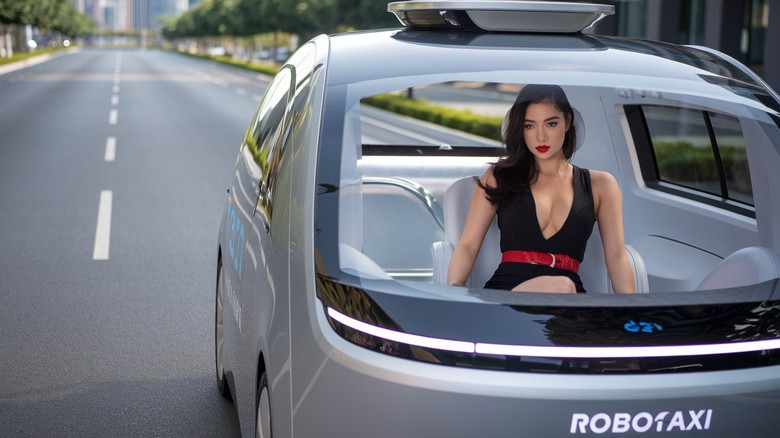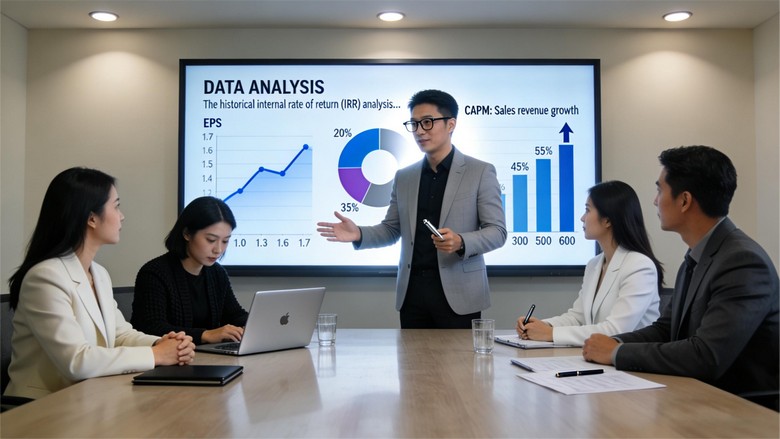



Founded in late 2016 by Peng Jun and Lou Tiancheng, Pony.ai is the first company in the world to launch a self-driving travel service (Robotaxi) in both China and the U.S. and is headquartered in Guangzhou.
Starting from China and the United States, Pony.ai has set up R&D centers in Silicon Valley, Guangzhou, Beijing, and Shanghai respectively, and has obtained qualifications and licenses for autonomous driving testing and operation in many places in China and the United States. With the latest breakthroughs in the field of artificial intelligence technology, Pony.ai has established cooperation with Toyota, Hyundai, FAW, GAC and other car manufacturers.
The Story of the New Careers Behind Autonomous Driving
With self-driving cabs gradually becoming one of the ways people travel, the topic of RoboTaxi "stealing the jobs of cab and online car drivers" has also risen in popularity.
Recently, "RoboTaxi hires self-driving safety officer to prioritize veteran drivers" has hit the hot spot and sparked concern and debate. This industry has ushered in a new dynamic.
Shenzhen headhunters share with you the story of the new careers behind autonomous driving. Before turning into driverless safety officers, they were online taxi drivers, full-time baby daddies, and vehicle testers.
Lu Weibing used to be an online taxi driver running his car in Wuhan.
He's one of those "if you can't help it, you can run an online car" kind of guys.
After graduating from high school, Lu Weibing entered the auto repair industry for six years, and then started his own business to open a repair store as a small boss.
But after the arrival of the trolley era, the traditional automobile repair industry had to face the problem of changing profession. So Lu Weibing chose to run a network car.
For Lu Weibing, who has 20 years of driving experience, the job of being a good online taxi driver is not difficult for him. With quality service and excellent driving skills, he can also live a comfortable life with a monthly salary of over ten thousand dollars.
However, Lou Reed Ice is a man who is very good at seizing opportunities.
In recent years, Wuhan City to speed up the opening of automatic driving test road, the first in the country to release the whole driverless commercialization pilot policy, to create "driverless first city".
Lu Weibing, who is based in Wuhan, is also keen to see the career dividend brought by the autonomous driving industry.
In 2022, Lu became a driverless safety officer in charge of tasks related to the safe operation of RoboTaxi cabs.
After joining RoboTaxi, Lu not only said goodbye to the old days of driving at least 12 hours a day, but also embraced a regular work schedule and the security of five insurance policies and one pension, and more importantly, more room for his career advancement.
Now promoted from safety officer to team leader of the unmanned ground safety officer team, Lu Weibing is the head of a team of more than a dozen people who specialize in responding to all kinds of emergencies in unmanned vehicles.
And his team, in addition to those who, like him, are from online car drivers, there are also takeaway boys, truck drivers and auto mechanics.
Li Cheng used to be a "full-time baby daddy".
He gave up his career after becoming a father in order to better accompany his child's growth. for eight years, Li Cheng has been devoted to taking care of the child until elementary school.
But for Li Cheng, who is in his prime, leaving the workplace for 8 years to return to the difficulty can be imagined. So introduced by a friend, he also started from the network car driver.
However, after not running the network car for a long time, Li Cheng joined RoboTaxi by chance and became a comprehensive test fleet safety officer.
This job compared to the network car, at first Li Cheng thought "very novel".
The job of a safety officer is to be responsible for the safety of vehicles as well as transportation participants in special situations.
That is to say, even if it is automatic driving, Li Cheng will still have to sit in the main driver's seat. But unlike the "driver", he no longer needs to operate the steering wheel or control the car system.
At first, Li Cheng will be nervous and afraid, but after the experience he found that the driverless and human driving, and even some aspects than human drivers to do better. For example, when encountering illegal parking, obstacles, the vehicle will slow down in advance to change lanes; the need to overtake when changing lanes, but also according to the situation automatically yield.
Over time, Li Cheng's children also have a strong interest in such high technology as drones, and he also encourages his children to develop in this direction and make a difference in the AI field in the future.
Before becoming a RoboTaxi safety officer, Juan Wang, 43, had been a full vehicle tester at an automotive manufacturing company for 20 years.
In 2018, Wang Juan realized that the automobile company it worked for was going downhill, and the original enterprise of nearly 30,000 people had been downsized to a few thousand. She decisively decided to resign.
After that, the autonomous driving industry attracted Wang Juan, and in 2020, she joined Baidu's Wuhan autonomous driving team as a safety officer.
Like Li Cheng, Wang Juan was deeply shocked by her first driverless ride. From the initial "insecurity" to the realization that the unmanned car can handle all kinds of emergencies on the road smoothly, Wang Juan felt that "human driving may not be as smooth as unmanned cars".
As a vehicle tester, Wang Juan needs to carefully check that the products leaving the factory meet the quality requirements, while as a safety officer, she needs to assist and help vehicles to deal with special situations. The details of the two jobs are different, but they also share some common concepts, which makes Wang Juan feel more and more identified with this profession.
Before joining RoboTaxi, Wang Juan was once worried that it would be difficult for a woman over 40 to move up in the workplace, but now she has become a manager at RoboTaxi, and the team she leads is highly motivated, well-executed, and energetic. This has made Wang Juan more and more confident and in better shape.
Nowadays, after work, she often popularizes self-driving technology with her friends and family, and acts as a popular science lecturer on unmanned vehicles.
Plenty of self-driving companies hiring safety officers
The story of Lu Weibing, Li Cheng and Wang Juan is just a microcosm of the people behind self-driving cabs, and there are many, many more employees and teams like them in the industry.
This may go against what some people think of "self-driving taxis": unmanned vehicles are not really "unmanned", and from a different point of view, it takes more manpower to put in an unmanned cab than it does to put in a manned cab.
According to the information of the recruitment platform, many companies of automatic driving are hiring safety officers in large quantities.
For example, the company above pays a salary of RMB 6,000-9,000 for self-driving test safety officers, who are responsible for safeguarding self-driving vehicles and handling emergencies during the driving process.
It is important to note that this position gives preference to those who have experience in passenger operations such as internet cab, cab, bus, or freight operations.
There's also Ponywise, which is hiring automation testers to collect self-driving vehicle test data, maintain vehicles, and other tasks, with a salary package of $6,000 to $10,000 dollars.
And as you can see based on their posting requirements, online cab and cab drivers can be said to fit almost perfectly.
In addition, Guangzhou Headhunter also noticed that many companies are hot recruiting autopilot safety officer and other related jobs with an average salary of 7-8 thousand.
And just recently, RoboTaxi's hiring of self-driving safety officers to prioritize veteran drivers generated a lot of attention, with many netizens praising it.
Looking beyond the surface to see the essence of the development of automated driving technology, not only is not "robbing jobs", but provides more jobs, and the quality of employment, upward mobility are on a higher level. Therefore, in fact, there is no need to feel anxious about the "replacement".
Behind the unmanned vehicle is the result of the efforts of countless people
Recently, the Ministry of Human Resources and Social Security, the State Administration for Market Supervision and Administration, and the National Bureau of Statistics jointly released 19 new occupations, such as network anchor, intelligent manufacturing system operator and maintainer, and intelligent networked automobile loader and operator and maintainer.
Among these 19 new occupations, Intelligent Manufacturing System Operator and Intelligent Networked Vehicle Installation and Maintenance Operator are the new occupations involving self-driving cabs.
In fact, everyone's anxiety about self-driving cabs "stealing jobs" is essentially caused by a lack of understanding of self-driving technology and related industries.
For example, from the perspective of the history of human development, we have experienced many industrial revolutions in the past hundred years: the steam engine, electricity, computers ...... and each revolution will have a number of jobs "disappeared", but more importantly, after each revolution for the human development of the liberation of productive forces, there will be More people into the higher-end field, to create more value.
To put it plainly, the future development of automatic driving will definitely exceed the "limitations" of human beings. For example, as a driver, the human eye's reaction speed is actually far less sensitive than the machine; at the same time, limited by the mental and psychological state, human drivers can not guarantee 100% concentration when driving; and this is the automatic driving can easily cope with the scene.
Based on this, the better the development of self-driving cabs, on the contrary, the more it can regulate the traffic environment, reduce the incidence of vicious accidents and create a safer travel scene.
And in the process of the development of autonomous driving, but also inseparable from the role of "people", will attract more talent to join, for more people to create more value.
China headhunters believe that "there is no driver in the unmanned car, but behind is the result of the efforts of countless talents", we are in the automatic driving dividend period, like the aforementioned Lu Weibing, Li Cheng, Wang Juan, etc., they are the first batch of "network car drivers" to seize the opportunity of the dividend! They are the first batch of "Netjob drivers" to seize the opportunity of the dividend. With the benefits brought by the development of self-driving technology, they have been able to increase their personal and family income. At the same time, their experience is also influencing the employment choices of the next generation, indirectly cultivating fresh blood for the entire AI industry, forming a virtuous ecological cycle.
In short, the development of the times, the pace of scientific and technological progress will not stop, I believe that more and more people will take advantage of the new technology this "east wind" to achieve higher development goals.



